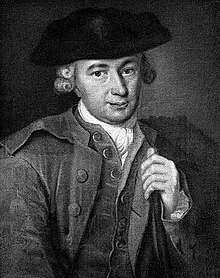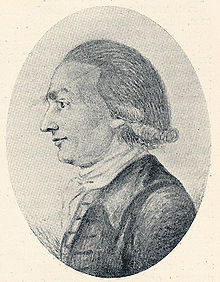Johann Georg Hamann
German philosopher
Johann Georg Hamann(August 271730–June 211788) was a German philosopher of the Counter-Enlightenment and a main proponent of theSturm und Drangmovement.


Quotes
edit- Poetry is the mother-tongue of the human race.
- Sämtliche Werken,ed. Josef Nadler (Vienna: Verlag Herder, 1949-1957), vol. II, p. 197.
- Every phenomenon of nature was a word, — the sign, symbol and pledge of a new, mysterious, inexpressible but all the more intimate union, participation and community of divine energies and ideas. Everything the human being heard from the beginning, saw with its eyes, looked upon and touched with its hands was a living word; for God was the word.
- Sämtliche Werken,ed. Josef Nadler (1949-1957), vol. III, p. 32.
- The philosophers have always given truth a bill of divorce, by separating what nature has joined together and vice versa.
- Sämtliche Werken,ed. Josef Nadler (1949-1957), vol. III, p. 40.
- Without language we would have no reason,without reason no religion, and without these three essential aspects of our nature, neither mind nor bond of society.
- Sämtliche Werken,ed. Josef Nadler (1949-1957), vol. III, p. 231.
- Not only the entire ability to think rests on language... but language is also thecrux of the misunderstanding of reason with itself.
- Sämtliche Werken,ed. Josef Nadler (1949-1957), vol. III, p. 286.
- If only I was as eloquent asDemosthenes,I would have to do no more than repeat a single word three times. Reason is language —Logos;I gnaw on this marrowbone and will gnaw myself to death over it. It is still always dark over these depths for me: I am still always awaiting an apocalyptic angel with a key to this abyss.
- Briefwechsel,ed. Arthur Henkel (Wiesbaden/Frankfurt: Insel Verlag, 1955-1975), vol. V, p. 177.
- Through a vicious circle of pure reason skepsis itself becomes dogma.
- Briefwechsel,ed. Arthur Henkel (1955-1975), vol. V, p. 432.
- Few authors understand themselves, and a proper reader must not only understand his author but also be able to see beyond him.
- Briefwechsel,ed. Arthur Henkel (1955-1975), vol. VI, p. 22.
- Self knowledge begins with the neighbor, the mirror, and just the same with true self-love; that goes from the mirror to the matter.
- Briefwechsel,ed. Arthur Henkel (1955-1975), vol. VI, p. 281.
- Being, belief and reason are pure relations, which cannot be dealt with absolutely, and are not things but pure scholastic concepts, signs for understanding, not for worshipping, aids to awaken our attention, not to fetter it.
- Briefwechsel,ed. Arthur Henkel (1955-1975), vol. VII, p. 165.
- A thirsty ambition for truth and virtue, and a frenzy to conquer all lies and vices which are not recognized as such nor desire to be; herein consists the heroic spirit of the philosopher.
- Socratic Memorabilia,J. Flaherty, trans. (Baltimore: 1967), p. 147.
- Let us assume that we invited an unknown person to a game of cards. If this person answered us, “I don’t play,” we would either interpret this to mean that he did not understand the game, or that he had an aversion to it which arose from economic, ethical, or other reasons. Let us imagine, however, that an honorable man, who was known to possess every possible skill in the game, and who was well versed in its rules and its forbidden tricks, but who could like a game and participate in it only when it was an innocent pastime, were invited into a company of clever swindlers, who were known as good players and to whom he was equal on both scores, to join them in a game. If he said, “I do not play,” we would have to join him in looking the people with whom he was talking straight in the face, and would be able to supplement his words as follows: “I don’t play, that is, with people such as you, who break the rules of the game, and rob it of its pleasure. If you offer to play a game, our mutual agreement, then, is that we recognize the capriciousness of chance as our master; and you call the science of your nimble fingers chance, and I must accept it as such, it I will, or run the risk of insulting you or choose the shame of imitating you.”… The opinion ofSocratescan be summarized in these blunt words, when he said to the Sophists, the leaned men of his time, “I know nothing.” Therefore these words were a thorn in their eyes and a scourge on their backs.
- Socratic Memorabilia,J. Flaherty, trans. (Baltimore: 1967), pp. 165-167.